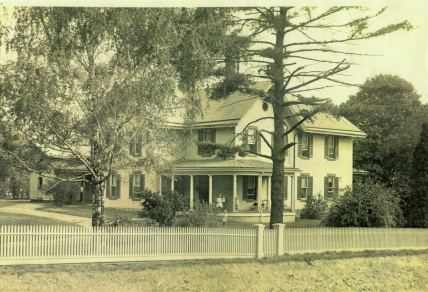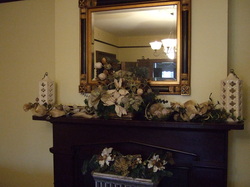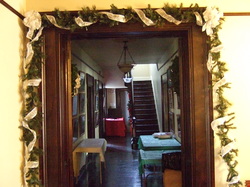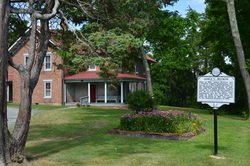After their marriage in 1841 and an extensive wedding trip, James C. and Persis Hagans McGrew set up housekeeping in this painted brick home known within the family as "The Pines." The original 1840's structure consists of the northern section of the present house, which is in Federalist style. After the Civil War, the McGrews added the large southern section which reflects an Italianate and Gothic Revival style. The McGrews lived here throughout their lives, raising their three children--William, Sarah Martha "Mattie," and George.
Today, it stands as a reminder of the tension filled days prior to and throughout the Civil War--a time when men like McGrew were called into service as representatives to the Virginia Convention, where secession from the Union was hotly debated. While McGrew was in Richmond, Mrs. McGrew was at home with their children and household, waiting and praying for his safe return. At various times throughout the War, any time that a Confederate force was near, the family knew that their home, as were others in Kingwood, was in great danger, for McGrew and other western county representatives had voted against secession and were branded as "traitors against the Commonwealth." That the home survives at all is a symbol of the United States' ability to prevail through rebellion, devastation, and reconciliation. It was accorded status on the National Register of Historic Places in 1993.
Thanks to a hand-drawn floor plan found in the archival collection of West Virginia University Library, we know today that the first floor of the House included a kitchen and extensive pantry, complete with china closet; a buttery, laundry boiler room, and separate bathtub room; a formal parlor, personal library for Mr. McGrew, and the couple's own bedroom. An impressive staircase leads to the second floor where as many as eight bedrooms are found. In its day, a total of fourteen fireplaces warmed the home, and that warmth was retained by the double-brick interior and exterior walls which, even today, provide insulation against heat in the summer and cold in winter. McGrew was always intrigued by modernizing his home, so in his mid-1860's renovation, he enclosed the family's well to provide an indoor source of water and later saw that gas lighting systems, electricity, and telephone service were installed. Beautiful, original woodwork, fireplaces, mantles, and hearthstones are still present throughout the House.
Today, it stands as a reminder of the tension filled days prior to and throughout the Civil War--a time when men like McGrew were called into service as representatives to the Virginia Convention, where secession from the Union was hotly debated. While McGrew was in Richmond, Mrs. McGrew was at home with their children and household, waiting and praying for his safe return. At various times throughout the War, any time that a Confederate force was near, the family knew that their home, as were others in Kingwood, was in great danger, for McGrew and other western county representatives had voted against secession and were branded as "traitors against the Commonwealth." That the home survives at all is a symbol of the United States' ability to prevail through rebellion, devastation, and reconciliation. It was accorded status on the National Register of Historic Places in 1993.
Thanks to a hand-drawn floor plan found in the archival collection of West Virginia University Library, we know today that the first floor of the House included a kitchen and extensive pantry, complete with china closet; a buttery, laundry boiler room, and separate bathtub room; a formal parlor, personal library for Mr. McGrew, and the couple's own bedroom. An impressive staircase leads to the second floor where as many as eight bedrooms are found. In its day, a total of fourteen fireplaces warmed the home, and that warmth was retained by the double-brick interior and exterior walls which, even today, provide insulation against heat in the summer and cold in winter. McGrew was always intrigued by modernizing his home, so in his mid-1860's renovation, he enclosed the family's well to provide an indoor source of water and later saw that gas lighting systems, electricity, and telephone service were installed. Beautiful, original woodwork, fireplaces, mantles, and hearthstones are still present throughout the House.
The grounds surrounding the House are home to many unusual and rare trees and shrubs, many of which were imported by Mr. McGrew. Impressive, towering trees still survive, and three are candidates for West Virginia's Champion Tree designation--a larch, a European beach, and a lilac, which is so old that it has outgrown its usual status as a shrub.
Following McGrew's death in 1910, the property was sold to the Lantz family and subsequently, in 1917, to the Gibson family. They resided there until the 1950's, happily raising their large family. Unfortunately, during the latter years of the Gibson ownership, the structure was converted into apartments. In the 1970's, it was sold to the Schwab family, and after some remodeling, it served as the Senior Citizens' Center. Then, in the late 1980's, the Preston County Commission purchased the property; their ownership extends through today. The House was closed, and the Commission began plans to raze it in order to construct new office space.
However, in 1989, the City of Kingwood Tourism Committee discovered the historical significance of what was then casually known as the "Gibson property." Local volunteers united to form the McGrew Society , later known as the legal 501-c-3 non-profit organization Society for Preservation of McGrew House, and in the early 1990's, the Society entered into an agreement with the County Commission to restore and maintain the property and to offer educational and cultural programs there.
By that time, though, the House had sustained tremendous damage. Its floors were rotted and windows broken; the roof had gaping holes; and the structure was overall unsound. But that did not deter the Preservation effort.
Through the years, grant monies, local sponsorships and donations, and funds raised by the Society have allowed the group to restore and renovate the House. As important as the money has been, thousands of hours from volunteers across Preston County have given the House new life for a new generation of West Virginians to enjoy and gain an appreciation for our State's heritage and forefathers--men like James C. McGrew.
Following McGrew's death in 1910, the property was sold to the Lantz family and subsequently, in 1917, to the Gibson family. They resided there until the 1950's, happily raising their large family. Unfortunately, during the latter years of the Gibson ownership, the structure was converted into apartments. In the 1970's, it was sold to the Schwab family, and after some remodeling, it served as the Senior Citizens' Center. Then, in the late 1980's, the Preston County Commission purchased the property; their ownership extends through today. The House was closed, and the Commission began plans to raze it in order to construct new office space.
However, in 1989, the City of Kingwood Tourism Committee discovered the historical significance of what was then casually known as the "Gibson property." Local volunteers united to form the McGrew Society , later known as the legal 501-c-3 non-profit organization Society for Preservation of McGrew House, and in the early 1990's, the Society entered into an agreement with the County Commission to restore and maintain the property and to offer educational and cultural programs there.
By that time, though, the House had sustained tremendous damage. Its floors were rotted and windows broken; the roof had gaping holes; and the structure was overall unsound. But that did not deter the Preservation effort.
Through the years, grant monies, local sponsorships and donations, and funds raised by the Society have allowed the group to restore and renovate the House. As important as the money has been, thousands of hours from volunteers across Preston County have given the House new life for a new generation of West Virginians to enjoy and gain an appreciation for our State's heritage and forefathers--men like James C. McGrew.



